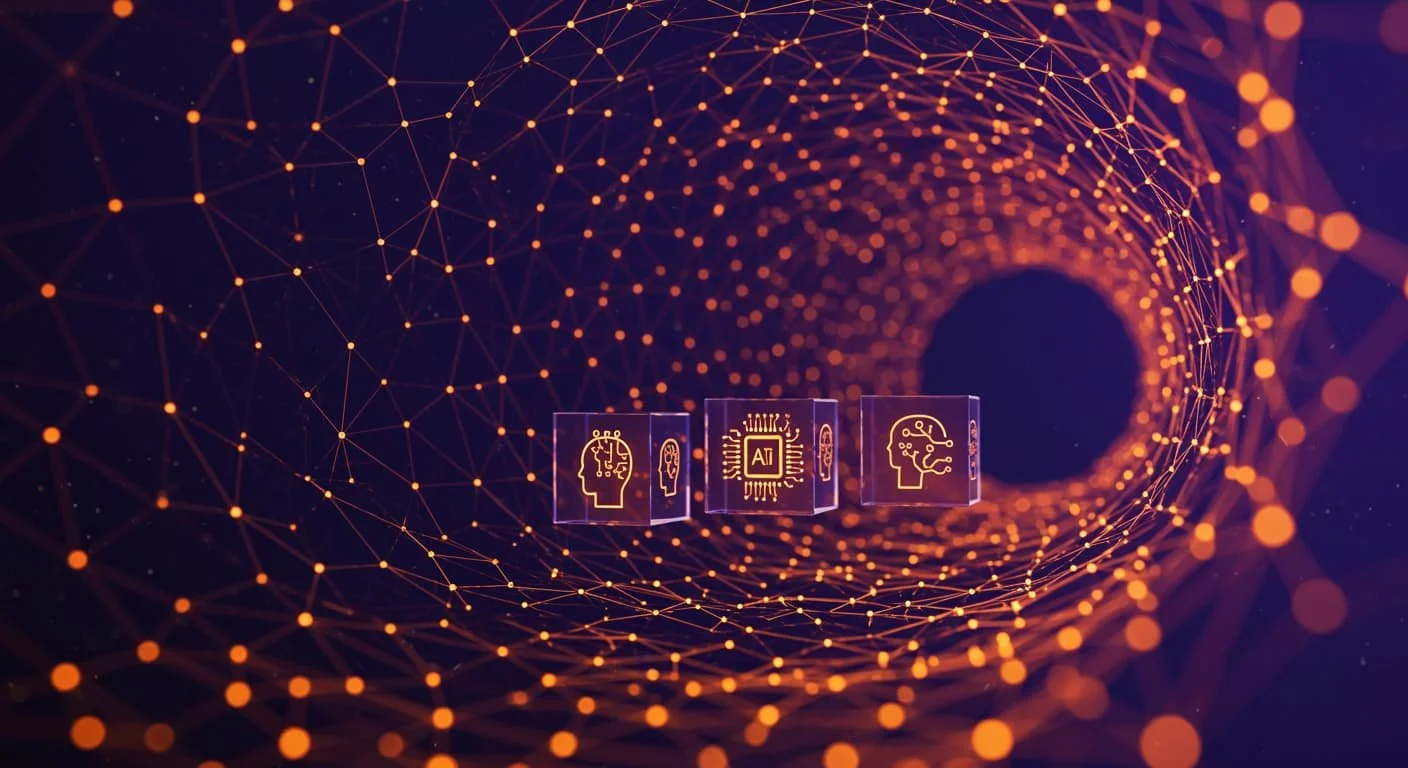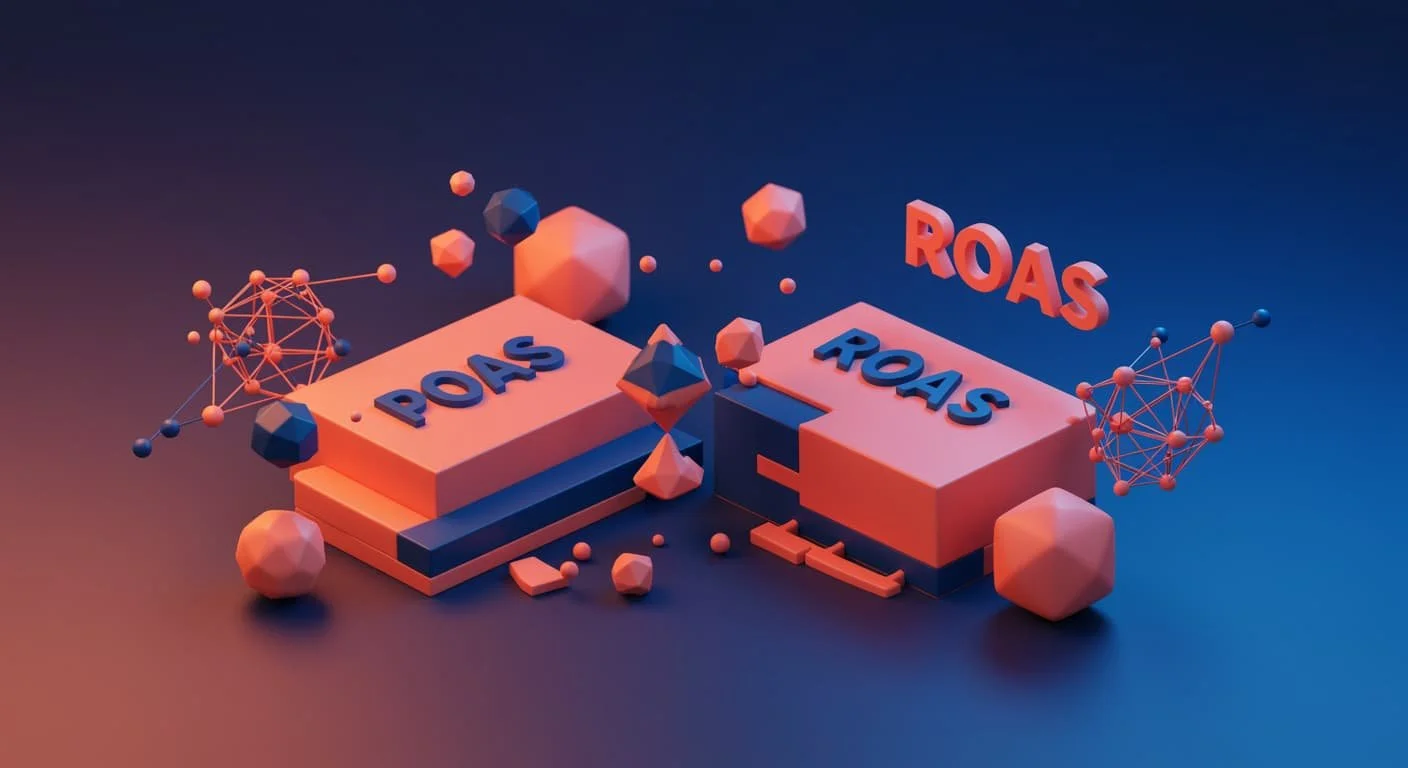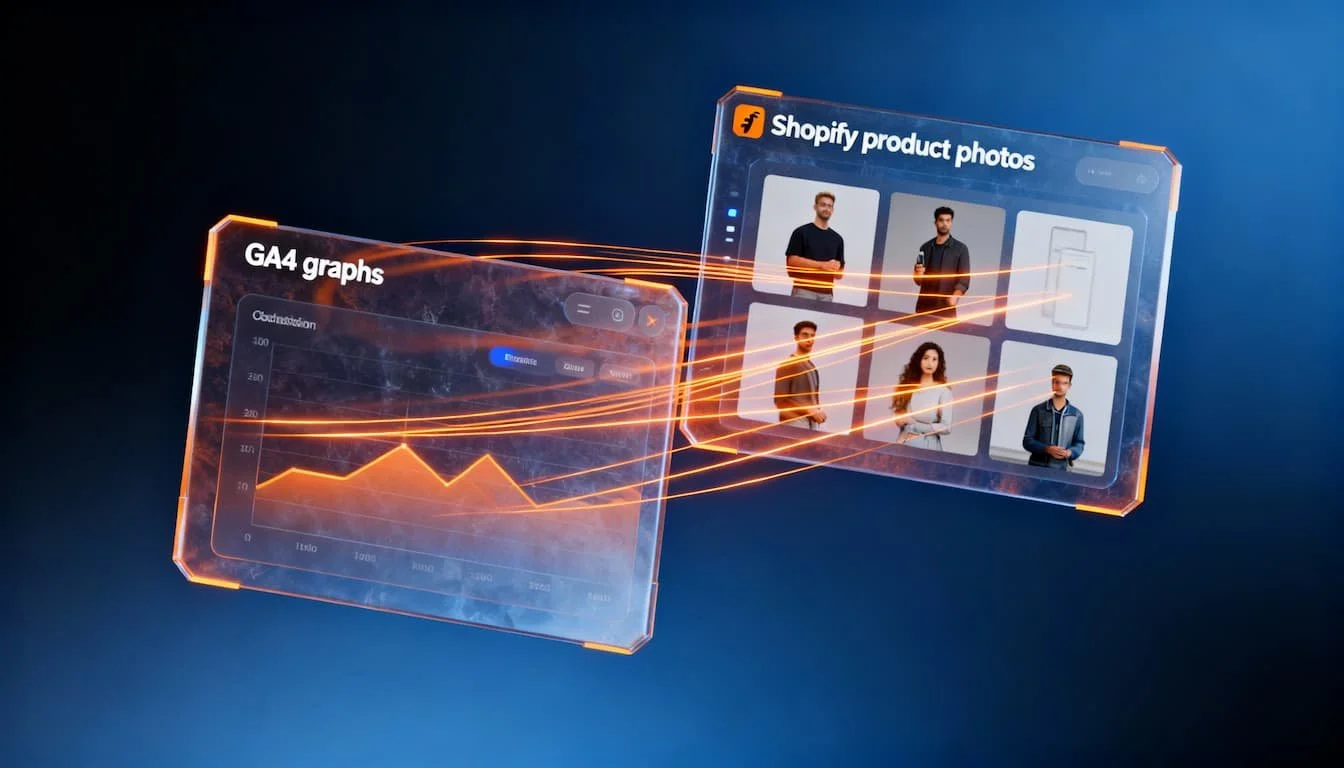How AI Transforms Online Marketing: Strategic Guide 2026
By 2026, artificial intelligence will no longer be an experimental tool but a strategic pillar of successful online marketing. While many companies in 2023 were still cautiously experimenting with ChatGPT, the question now is no longer whether to use AI, but how quickly and strategically to implement it. This evolution brings both unprecedented opportunities and new challenges.
- Tipping point reached: 80% of consumers rely on zero-click search results, 75% of marketers will use AI by 2026
- 6 biggest trends: Hyper-personalization, AI agents, zero-click SEO, predictive marketing, conversational commerce, first-party data
- AI agents replace tasks: Autonomous systems manage campaigns, optimize budgets, adjust strategies
- 35% higher conversions: Nike's AI system analyzes real-time behavior for personalized products
- 60% zero-click searches: Content influences thousands of people via AI citations without generating traffic
- 4-step implementation: AI audit, high-impact applications, data infrastructure, advanced experiments
From experimentation to AI-native marketing
The tipping point has been reached. Research by Bain & Company shows that 80% of consumers now rely on "zero-click" search results for at least 40% of their searches. This means that AI systems are increasingly becoming the first and last source of information for potential customers.
At the same time, adoption within marketing teams is growing exponentially. While only 47% of marketers regularly used AI in 2024, experts expect this percentage to exceed 75% by 2026. The reason is simple: companies that do not embrace AI lose ground to competitors who do.
“I believe 2025 will be crucial. The stakes are high. These are disruptive times. In 2025, we must be relentlessly focused on unlocking the benefits of this technology and solving real user problems”
The 6 biggest AI marketing trends of 2026
1. Hyper-personalization at scale
By 2026, personalization will go far beyond a first name in an email. AI systems now analyze real-time behavior, predict needs before customers express them, and dynamically adapt experiences.
Practical example: Nike's revolutionary AI system analyzes customer behavior across apps, websites, and physical stores. Result: 35% higher conversion rates through personalized products suggested at the exact moment customers need them.
Accessible alternatives are available for SMEs. ClickForest's AI content creation services help businesses produce personalized content at scale without large investments.
2. AI agents replace basic marketing tasks
The real breakthrough of 2026 lies in autonomous AI agents that fully take over complex marketing processes. These systems go beyond chatbots – they manage campaigns, optimize budgets, and adapt strategies without human intervention.
What they can do:
Adjust real-time bidding strategies
Optimize email send times per recipient
Personalize website layouts for different visitors
Automatically synchronize cross-channel data
Do you want to know how your company can implement AI agents? Discover our AI automation services and read more about AI agents in marketing.
3. Zero-click SEO and AI visibility
With 60% of all searches ending without a click, the focus shifts from "ranking" to "visibility". Google's AI Overviews and platforms like ChatGPT and Perplexity cite content without directing traffic.
The new reality: Your content can influence thousands of people without you noticing it in your analytics. Optimizing for AI citations becomes more crucial than traditional SEO.
This is precisely why combining SEO and AI has become so important. Also read our guide on GEO strategies for 2026 and why zero-click searches are important.
“I have always thought that AI is the most profound technology humanity is working on – more profound than fire or electricity or anything we've ever done in the past”
4. Predictive marketing goes mainstream
AI now not only predicts trends but also anticipates individual customer needs. E-commerce companies use predictive analytics to adjust inventory, pricing, and promotions in real-time.
Practical examples:
Amazon predicts what you need before you search for it
Spotify's AI DJ adjusts music based on your mood
Netflix predicts content you'll enjoy with 80% accuracy
5. Conversational Commerce Is Booming
The line between content, conversation, and commerce is blurring. AI chatbots are evolving into shopping assistants that guide complex purchases and build customer relationships.
Impact on results: Businesses leveraging conversational marketing see an average of 41% more sales and significant cost savings in customer service.
Interested in chatbots and conversational marketing? Our CRO services integrate AI-driven conversation optimization.
6. First-Party Data as AI Fuel
With the phasing out of third-party cookies, first-party data is becoming the primary fuel for AI marketing. Businesses with robust data strategies will gain an insurmountable advantage.
“AI is not fate. We must choose wisely. We must design intentionally. And we must keep people at the center of this revolution. Jobs will change, and as with any major technological shift, some will disappear – and new ones will emerge”
Practical Implementation: How to Get Started?
Step 1: Audit Your Current AI Maturity
Which AI tools are you already using?
How automated are your processes?
What data do you collect about customers?
Book an AI audit to discover where your biggest opportunities lie.
Step 2: Start with High-Impact, Low-Risk Applications
Easy Quick Wins:
ChatGPT for Content Creation and Brainstorming
AI-Driven Email Segmentation
Automated Social Media Scheduling
Chatbots for Frequently Asked Questions
Ready to get started? Discover our top AI tools for marketers and learn how to write better prompts.
“The shift towards value-driven content reflects a broader demand for authenticity and trust in marketing. Consumers don't just choose products – they align with brands that resonate with their beliefs”
Step 3: Invest in Data Infrastructure
Good AI starts with good data. Ensure:
Integrated CRM systems
Unified customer profiles
Real-time analytics
Privacy-compliant data collection
Step 4: Experiment with advanced applications
For advanced users:
Predictive lead scoring
Dynamic pricing optimization
Cross-channel attribution modeling
AI-generated video content
For e-commerce businesses, there are specific opportunities with AI and Shopify apps and conversion optimization with AI.
The dark side: challenges and pitfalls
Ethical AI becomes business-critical
With growing AI adoption, risks also increase. Algorithm bias, privacy concerns, and transparency issues can damage brand value.
Best practices:
Clearly label AI-generated content
Test for prejudice and bias
Ensure human oversight on critical decisions
Invest in AI ethics training
The AI paradox: more automation, more humanity needed
As marketing becomes more automated, the human touch becomes more valuable. Brands that find this balance win.
“We have reached employees in 24 countries across Europe. We are investing heavily to advance the most transformative applications of AI, in a way that benefits everyone”
ROI of AI marketing: what can you expect?
Proven results from 2024-2026:
35% higher conversion rates through hyper-personalization
25% faster campaign optimization
40% better content output quality
50% reduction in repetitive tasks
30% improved customer lifetime value
Investment vs. Return: The average ROI of AI marketing ranges from 200-400% within the first year, provided it is implemented correctly.
“In history, you don't always have to be first, but you must execute well and truly be best-in-class as a product. That's what 2025 is about”
Outlook: what comes after 2026?
Multimodal AI
AI that combines text, image, audio, and video for fully integrated marketing campaigns.
Real-world personalization
AI that translates online behavior into physical experiences – imagine digital billboards that adapt based on passersby.
Autonomous marketing ecosystems
Fully self-learning marketing systems that develop, test, and optimize strategies without human input.
Conclusion: the new marketing reality
AI has fundamentally transformed online marketing from a reactive to a predictive discipline. By 2026, it will no longer be about following trends, but about anticipating customer needs before they manifest.
The core message is clear: Start experimenting now, invest in data infrastructure, and develop AI literacy within your team. The companies that embrace AI as a strategic partner – not as a replacement for human creativity – will be tomorrow's winners.
The question is not whether AI will transform your marketing, but how quickly you embrace the transformation.
Ready to take the next step? Explore our AI-for-growth services, discover our performance marketing approach, or schedule a no-obligation consultation to discuss your AI marketing strategy.

🚀 More leads, higher conversion, better ROI
This article provided you with insights. Now it's time for action. Whether you want to build a profitable webshop, generate more revenue from performance marketing or SEO, or grow with AI marketing - we provide concrete support to help you move forward.
💬 Discuss your challenge directly with Frederiek: Schedule a free strategy consultation or send us a message
📧 Prefer to email? Send your question to frederiek@clickforest.com or call +32 473 84 66 27
Strategy without action remains theory. Let's take your next step together.
Frequently Asked Questions about AI in Online Marketing
-
Start with 10-20% of your marketing budget for AI tools and training. Successful companies gradually invest up to 40-50% of their budget in AI-driven initiatives.
-
No, but it can drastically change tasks. AI takes over repetitive tasks, allowing marketers to focus on strategy, creativity, and relationship management.
-
Traditional metrics like CTR remain important, but add new KPIs: AI citations, brand mentions in AI platforms, and customer lifetime value improvements.
-
Must-haves: ChatGPT/Claude for content, HubSpot/Salesforce for CRM-AI, Google Analytics 4 with AI insights, and a marketing automation platform with AI features.
Discover our complete guide on AI marketing tools and advanced prompt engineering.
-
Follow AI marketing newsletters, experiment monthly with new tools, and invest in continuous training for your team.
-
Absolutely. Many AI tools are affordable and specifically designed for SMEs. Start small and scale gradually.
Read why hiring a marketing expert is often smarter than DIY and discover the benefits of outsourcing online advertising.
-
Over-automation, loss of brand personality, privacy issues, and dependence on AI platforms. Balance and human control are crucial.
-
Be transparent about AI use, test for bias, respect privacy laws, and maintain human oversight in important decisions.
-
They don't disappear, but evolve. Email marketing becomes AI-driven, SEO becomes AI-optimized, and social media becomes AI-personalized.
Sources & References
AI trends and strategic developments:
Bain & Company: "Goodbye clicks, hello AI: zero-click search redefines marketing" - https://www.bain.com/insights/goodbye-clicks-hello-ai-zero-click-search-redefines-marketing/
WordStream: "5 AI marketing trends to watch in 2025" - https://www.wordstream.com/blog/ai-marketing-trends-2025
Smart Insights: "AI marketing trends in 2025: 6 trends and innovations" - https://www.smartinsights.com/digital-marketing-strategy/ai-marketing-trends-2025/
Marketing automation and AI agents:
Salesmate: "Navigating AI automation trends: key insights for 2025" - https://www.salesmate.io/blog/ai-automation-trends/
Bannerflow: "AI and marketing: 2025 trends in real-time optimization" - https://www.bannerflow.com/blog/ai-marketing-2025-trends
Zero-click searches and AI visibility:
Scrum Digital: "Zero-click searches in 2025: key SERP trends" - https://scrumdigital.com/blog/zero-click-search-trends-google-serp-analysis/











